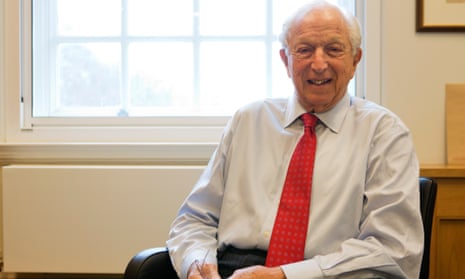Lord Woolf, who chaired the inquiry into the Strangeways prison riot, has blamed the competition between political parties to show they are tough on crime for holding back progress in improving jail conditions in England and Wales.
In a lecture to mark 25 years since the disturbance, the former Lord Chief Justice will say that a collective failure of leadership by politicians to combat a hostile media has impeded positive steps to reform the system.
Woolf will deliver the lecture as the Prison Reform Trust, which he now chairs, publishes a report on HMP Manchester, formerly Strangeways, which shows that nearly half of the prisoners are still “doubled up” with two men being held in cells designed for only one inmate.
The Strangeways riot and rooftop protest began on 1 April 1990, lasted 25 days and left two men dead and 194 injured. It triggered a series of disturbances in prisons across England, Wales and Scotland. The Guardian described Woolf’s report as a blueprint for the restoration of “decency and justice into jails where conditions had become intolerable”.
The warning comes after a row blew up over claims by Labour that the Liberal Democrats are “soft on crime, drugs and thugs” for supporting the end of the use of prison sentences for the possession of illegal drugs for personal use.
The Labour attack drew dismay from drug reform campaigners. Danny Kushlick, of the drugs thinktank Transform, said: “We weren’t expecting them to take a progressive position, but this is positively medieval – imprisonment for possession. And it’s working-class people from Labour heartlands who’ll suffer. They should be ashamed of themselves.” The veteran Labour drugs law reform campaigner, Paul Flynn, accused his party of underestimating the intelligence of the electorate.
In his lecture, Woolf will say that progress in reducing chronic levels of overcrowding and improving the treatment of prisoners has been set back by the reluctance of politicians to “explain to the public the limited improvements that can be achieved by a greater reliance on more and longer imprisonment”.
He will say that positive steps to reform the system since the 1990 riots have been impeded by the failure of political leaders “to combat hostile media and the contest between political parties as to who could be the toughest on crime. Most politicians believe there are no votes in prisons and mistakenly think there are votes in being toughest on crime”.
Woolf believes the political parties should sign up to an undertaking to “advance the cause of achieving a just system without engaging in a political contest. Let’s take the politics out of prisons”.
He argues that there is no reason why the sentencing policy of judges and magistrates should ignore the difficult financial state of the country. He will say: “Even the health service is not spared difficult decisions as to priorities and, surely, the economic consequences of the use of imprisonment should not be excluded from rigorous scrutiny.”
The prison population has risen from 45,000 at the time of the Strangeways riot to a record 85,000 in England and Wales. The Woolf report, which was published in February 1991, made more than 200 proposals for reform including the end of “slopping out”, the appointment of a prisons ombudsman and the introduction of telephones on landings so inmates could keep in closer touch with their families.
Juliet Lyon, the director of the Prison Reform Trust, said: “The past two years have seen a worrying deterioration in safety. This has set back painstaking progress made by the prison service since Lord Woolf’s report to improve treatment and conditions. An incoming administration in May 2015 must not accept this decline in prison standards as the new normal.”

Comments (…)
Sign in or create your Guardian account to join the discussion